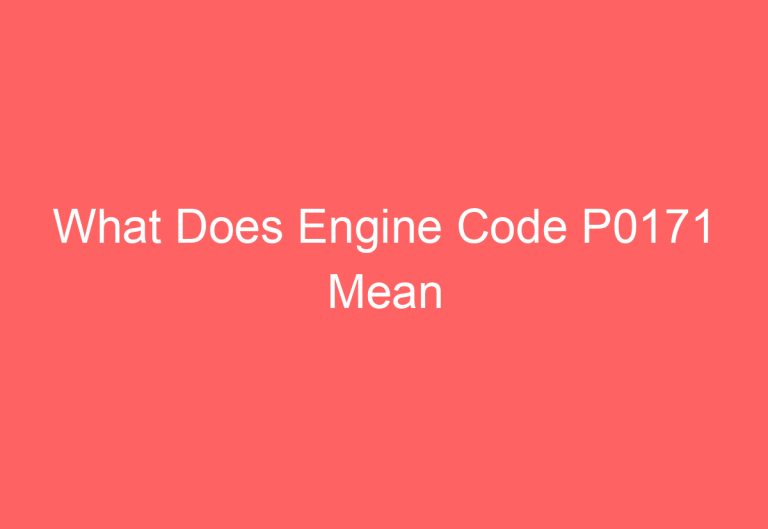Can An Engine Misfire Without Throwing A Code [Find Out]
Yes, an engine can misfire without throwing a code. There are a number of reasons why this might happen, including
A faulty spark plug or wire can cause the spark to not reach the cylinder, resulting in a misfire.
A dirty or clogged fuel injector can prevent the proper amount of fuel from reaching the cylinder, also resulting in a misfire.
A problem with the camshaft or crankshaft sensors can cause the engine to misfire because the timing is off.
A problem with the oxygen sensor can cause the engine to run too rich or too lean, which can also lead to misfires.
So Can An Engine Misfire Without Throwing A Code?
Yes, an engine can misfire without throwing a code. This is because the OBD-II system is designed to monitor certain specific parameters, and a misfire may not cause any of those parameters to go out of range. For example, a misfire may not cause the engine to run rich or lean, or it may not cause the exhaust gas temperature to increase. Additionally, the OBD-II system may not be able to detect a misfire if it occurs only intermittently.
Can an Engine Misfire Without Throwing a Code?
An engine misfire occurs when one or more of the cylinders in an engine fails to fire properly. This can cause a variety of problems, including decreased fuel economy, decreased power, and increased emissions. In some cases, an engine misfire can also lead to damage to the engine.
Can an Engine Misfire Without Throwing a Code?
Yes, an engine can misfire without throwing a code. This is because there are a number of different things that can cause an engine misfire, and not all of them will trigger the engine’s computer to throw a code.
Some of the most common causes of a misfire without a code include:
A dirty or faulty spark plug:
A dirty or faulty spark plug can cause the spark to be weak, which can lead to a misfire.
A bad ignition coil:
An ignition coil that is not working properly can cause the spark to be weak, which can also lead to a misfire.
A leaking valve:
A leaking valve can allow air to enter the cylinder, which can cause the air-fuel mixture to be too lean and lead to a misfire.
A plugged fuel injector:
A plugged fuel injector can prevent the engine from getting enough fuel, which can also lead to a misfire.
Symptoms of an Engine Misfire
The symptoms of an engine misfire can vary depending on the severity of the misfire. Some of the most common symptoms include:
Rough idle:
The engine may idle roughly or shake when it is idling.
Engine hesitation:
The engine may hesitate or stall when you accelerate.
Reduced power:
The engine may lose power or have difficulty accelerating.
Increased emissions:
The engine may emit more smoke than usual.
Diagnosing an Engine Misfire
If you suspect that your engine is misfiring, it is important to have it diagnosed by a qualified mechanic. The mechanic will be able to use a variety of diagnostic tools to identify the cause of the misfire and recommend the appropriate repairs.
Treating an Engine Misfire
The treatment for an engine misfire will depend on the cause of the misfire. Some of the most common repairs for an engine misfire include:
Replacing the spark plugs:
If the spark plugs are dirty or faulty, they will need to be replaced.
Replacing the ignition coils:
If the ignition coils are not working properly, they will need to be replaced.
Replacing the valves:
If the valves are leaking, they will need to be replaced.
Cleaning or replacing the fuel injectors:
If the fuel injectors are plugged, they will need to be cleaned or replaced.
Preventing Engine Misfires
There are a number of things you can do to help prevent engine misfires, including:
Regularly changing the oil and spark plugs:
Keeping your engine well-maintained is essential for preventing misfires.
Using high-quality gasoline:
Using high-quality gasoline can help to prevent engine problems, including misfires.
Avoiding idling the engine for long periods of time:
Idling the engine for long periods of time can cause the engine to overheat, which can lead to misfires.
Following the manufacturer’s recommended maintenance schedule:
Following the manufacturer’s recommended maintenance schedule can help to prevent engine problems, including misfires.
Conclusion
An engine misfire can be a serious problem, but it is important to remember that it is often fixable. If you suspect that your engine is misfiring, it is important to have it diagnosed and repaired as soon as possible.
Also Read: Do You Have To Code In Unreal Engine
FAQs: Can an Engine Misfire Without Throwing a Code?
What is a misfire?
A misfire occurs when a spark plug fails to fire, causing the cylinder to not produce power. This can happen for a variety of reasons, such as a bad spark plug, a weak spark, or a clogged fuel injector.
Can an engine misfire without throwing a code?
Yes, an engine can misfire without throwing a code. This is because the OBD-II system is not designed to detect all misfires. Some misfires are too small or too infrequent to be detected by the OBD-II system.
What are the symptoms of a misfire?
The symptoms of a misfire can include:
Engine hesitation or surging
Rough idle
Increased emissions
Poor fuel economy
Engine knocking
Engine stalling
How is a misfire diagnosed?
A misfire can be diagnosed by a qualified mechanic using a variety of tools, including:
A scan tool
A stethoscope
A compression test
A leakdown test
How is a misfire repaired?
A misfire is repaired by identifying and correcting the underlying cause. This may involve replacing the spark plugs, the spark plug wires, the fuel injectors, or the ignition coil.
Additional Resources
[How to Diagnose a Misfire](https://www.yourmechanic.com/article/how-to-diagnose-a-misfire)
[How to Fix a Misfire](https://www.carparts.com/blog/how-to-fix-a-misfire)
[Misfires: Causes, Symptoms, and Diagnosis](https://www.autozone.com/diy/engine-repair/misfires)




![Which Vin Number Is The Engine Code [Uncovered]](https://automotiveglory.com/wp-content/uploads/2024/05/which-vin-number-is-the-engine-code-uncovered_6086-768x529.jpg)

